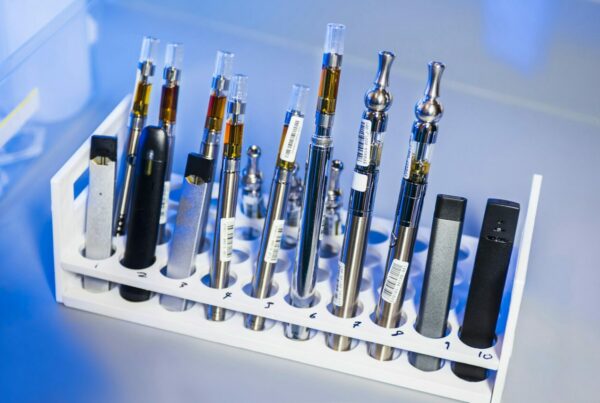N, N-Dimethyltryptamine (DMT) is a compound that is commonly found in both plants and animals, known for its intense but short-lived psychedelic effects upon ingestion.
There is growing evidence to suggest that DMT, which occurs naturally in the body, plays important roles in the peripheral and central nervous systems and might act as a neurotransmitter.
DMT can trigger powerful psychedelic effects, but it generally does not cause many negative side effects, apart from potential cardiovascular problems when administered in large doses through injection.
Let’s examine DMT and its various functions. These functions range from recreational use to its promising potential in scientific research and therapeutic uses.

DMT: A Brief Introduction
| Feature | Information |
| Name | N, N-Dimethyltryptamine (DMT) |
| Classification | Indole alkaloid |
| Presence | Naturally found in various plants and animals |
| Psychoactive Effects | Intense, brief psychedelic experiences upon consumption. |
| Method of Use | Can be smoked, injected, or ingested orally. |
| Duration of Effects | Brief duration, typically between 5 to 30 minutes. |
| Chemical Structure | Comprises a tryptamine core with two methyl groups attached to the nitrogen atom of the amine. |
| Metabolism | Rapidly metabolized by the body, broken down by monoamine oxidase (MAO). |
| Historical Use | Historically used in various ceremonial and shamanic rituals by indigenous cultures. |
| Alternative Names | Dimitrifantasiabusinessman’s tripBusinessman’s special45-minute psychosisspiritual molecule |
The Role of DMT in Mental Health
N, N-Dimethyltryptamine (DMT), a compound famous for its powerful psychedelic effects, is gaining attention for its potential benefits to mental health. Despite its conventional reputation for inducing intense hallucinatory experiences, recent research suggests a connection between DMT and mental wellness.
Effects on Psychological and Emotional Mental Well-being
DMT is known for producing profound psychedelic effects, which can elicit deep emotional responses and alter states of consciousness. These characteristics may pave the way for innovative therapeutic strategies to address mental health problems, aid in emotional healing, and offer new perspectives on personal traumas.
Brain Function and Neuroplasticity
Research suggests that DMT could influence neuroplasticity, thereby enhancing the brain’s ability to adapt and remodel itself. Understanding its impact on synaptic plasticity and neural connectivity might lead to potential treatments for disorders caused by neural maladjustments.
DMT’s Potential Therapeutic Application for Mental Health Conditions
Emerging research underscores DMT’s potential in treating mental health disorders such as depression, addiction, and PTSD. Its ability to induce mystical or spiritual experiences could represent a novel approach in psychotherapy, assisting in the transformation of negative thought patterns.
The investigation of DMT’s natural presence within the human body highlights its significance in mental health resilience, stress response, and overall psychological well-being. A better understanding of how the body regulates its internal DMT levels could lead to innovative therapeutic interventions.
DMT’s Role in Mental Health Disorders
| Mental Health Disorder | Description | Proposed Effectiveness of DMT | Potential Benefits |
| Depression | A mood disorder characterized by persistent sadness, disinterest, and reduced motivation | Preliminary research suggests DMT could help alleviate symptoms by inducing emotionally profound experiences. | DMT’s rapid onset and potential to stimulate transformative experiences may offer fresh, unique therapeutic approaches to reshape negative thought patterns and enhance emotional healing. |
| Post-Traumatic Stress Disorder (PTSD) | A mental health condition triggered by traumatic events, leading to flashbacks, intense anxiety, and intrusive thoughts | Initial studies suggest DMT could help manage symptoms by inducing spiritual or mystical experiences, potentially assisting patients in reinterpreting traumatic memories. | DMT’s potential to induce altered states of consciousness could facilitate emotional processing and provide a fresh perspective on traumatic experiences. |
| Addiction | A complex disorder marked by compulsive engagement in rewarding stimuli despite negative consequences | Some research suggests DMT could play a role in disrupting addictive patterns and reducing substance cravings. | DMT’s potential to stimulate powerful transformative experiences could help individuals alter their behavioral patterns and address their addictions. |
Approaches to Using DMT
DMT, a substance that triggers short but intense psychedelic experiences, can be administered in a variety of ways. The choice of method often hinges on the desired potency and duration of the trip.
Smoking:
DMT, when smoked in a pipe or vaporized, necessitates careful temperature monitoring to avoid overheating and burning the compound. The onset of a psychedelic trip via smoking DMT is almost instantaneous, typically lasting between 5 to 15 minutes.
Oral Intake:
Taking DMT orally gives rise to slower onset effects that can last for several hours. This is due to the slower metabolism of DMT when it’s combined with an MAOI.
Injection:
Injecting DMT straight into the bloodstream can produce swift and powerful effects.
This method triggers an immediate and potent experience, but it demands accurate dosing and involves higher risks.
Insufflation (Snorting):
Snorting DMT results in a slower onset of effects compared to smoking, but it may provide a more prolonged experience.
Sublingual or Buccal Administration:
When DMT is absorbed through the oral mucosa, this method represents an alternative to smoking and delivers a longer, though less intense, experience.
Determining Therapeutic Dosage: N, N-Dimethyltryptamine (DMT)
For smoking, the proposed dosage ranges from 20 to 40 mg, while for intravenous use, the suggested dosage is 0.2 to 0.4 mg per kg of body weight. These dosing guidelines are primarily intended for clinical research, especially when it comes to intravenous use.
- Higher doses given intravenously can lead to vivid visuals, temporary loss of control, and a mixed state of anxiety and euphoria
- Interestingly, lower doses have demonstrated less favorable effects
- Recreational doses of smoked DMT usually vary from 40 to 50 mg, at times even reaching up to 100 mg
- Different doses of intravenous Individuals who have experienced near-death episodes associated with DMT (dosages of 7, 14, 18, and 20 mg) have reported significant and enduring enhancements in their mental health.
Availability of DMT
ProductsOsmosis – 4-ACO-DMT Ethereal Essence Tincture
This tincture is advertised as containing 4-Acetoxy-N, N-dimethyltryptamine (4-AcO-DMT), a variant of DMT. Tinctures are liquid extracts designed for oral use, and this particular product could offer a different experience compared to regular DMT.
Lucid Supply Co. – 5-MeO DMT Vaporizer
This product is a vaporizer that delivers 5-Methoxy-N, N-dimethyltryptamine (5-MeO-DMT). 5-MeO-DMT, a potent compound known for its transformative and often short-lived effects, is the active ingredient.
Integral Alchemist – Acacia – 1ml DMT Vape Cartridge
The DMT vape cartridge offered by Integral Alchemist comes pre-filled with N, N-Dimethyltryptamine. This product is likely designed for individuals who prefer a discreet and convenient method of consuming DMT.
Deadhead Chemist – 5-Meo-DMT Cartridge
This cartridge houses 5-Methoxy-N, N-dimethyltryptamine (5-MeO-DMT), a substance noted for its deeply impactful and intense effects.
Possible mental health benefits may be associated with personal growth, spiritual experiences, or therapeutic uses aimed at enhancing emotional health.
Deadhead Chemist – N, N DMT Cartridge
A separate offering from Deadhead Chemist, this cartridge holds the traditional N, N-Dimethyltryptamine. Cartridges present a user-friendly means of DMT consumption, providing a more consistent and stable experience.
Concluding Remarks
The consumption of N, N-Dimethyltryptamine (DMT) in
How can DMT influence my mental health?
The path of mental health therapy can be complex yet thrilling. The ability of the compound to induce intense, albeit transient, psychedelic experiences opens up innovative therapeutic possibilities.
Preliminary studies hint at its potential in emotional processing, personal development, and potentially
The profound implications of mental health therapy demand careful contemplation and responsible usage.
If you are interested in responsibly exploring DMT products, reliable sources like Magic Mushies Canada Online Dispensary can provide guidance and a variety of options.
Frequently Asked Questions:
How do different DMT products affect mental health?
For instance, vaporizers may produce rapid effects, whereas tinctures or vape cartridges might provide more controlled and consistent doses.
Incorporating derivative compounds or 5-MeO-DMT could result in varying degrees of intensity and diverse impacts on mental health.
These nuanced differences underscore the importance of selecting a DMT product based on individual preferences and mental health goals.
Can DMT lead to enduring changes in mental health and personal growth?
There are anecdotal accounts that suggest DMT-induced experiences could have long-lasting effects on mental health and personal evolution.
Highly impactful or transformational experiences, like those resembling near-death situations, are frequently associated with ongoing positive changes in psychological wellbeing and personal development.
Despite these experiences being intense and ephemeral, they often trigger self-exploration, spiritual revelations, and a sense of interconnectedness or enlightenment.
Users often report a revitalized perspective on life, enhanced emotional resilience, and an amplified appreciation for life following these experiences.
What is the optimal way to use DMT for mental health?
It’s essential to make informed decisions, which includes thorough research and an understanding of the compound’s effects.
Advice from mental health professionals or experienced users can provide valuable perspective on potential risks and rewards.
Assessing personal tolerance and mental preparedness is also vital, as is ensuring a supportive and safe environment for the experience.
How does DMT stack up against other psychedelic treatments such as psilocybin or LSD in the realm of mental health therapy?
DMT varies in terms of effects, duration, and intensity compared to other psychedelics like psilocybin or LSD, offering a shorter duration.
Due to the unique experiences afforded by these high-intensity, short-acting psychedelics, distinct therapeutic methods are required in mental health, differing from those employed for longer-lasting psychedelics.
Recommended Additional Reading:





